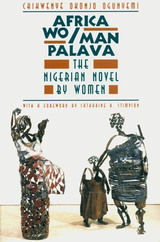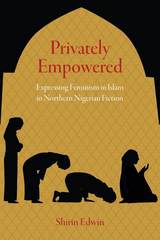2 books about Nigerian fiction (English)

Africa Wo/Man Palava
The Nigerian Novel by Women
Chikwenye Okonjo Ogunyemi
University of Chicago Press, 1995
Africa Wo/Man Palava offers the first close look at eight Nigerian women writers and proposes a new vernacular theory based on their work. Flora Nwapa, Adaora Lily Ulasi, Buchi Emecheta, Funmilayo Fakunle, Ifeoma Okoye, Zaynab Alkali, Eno Obong, and Simi Bedford are the writers Chikwenye Okonjo Ogunyemi considers. African womanism, an emerging model of female discourse, is at the heart of their writing. In their work, female resistance shifts from the idea of palava, or trouble, to a focus on consensus, compromise, and cooperation; it tackles sexism, totalitarianism, and ethnic prejudice. Such inclusiveness, Ogunyemi shows, stems from an emphasis on motherhood, acknowledging that everyone is a mother's child, capable of creating palava and generating a compromise.
Ogunyemi uses the novels to trace a Nigerian women's literary tradition that reflects an ideology centered on children and community. Of prime importance is the paradoxical Mammywata figure, the independent, childless mother, who serves as a basis for the new woman in these novels. Ogunyemi tracks this figure through many permutations, from matriarch to exile to woman writer, her multiple personalities reflecting competing loyalties—to self and other, children and nation. Such fragmented personalities characterize the postcolonial condition in their writing. Mapping geographies of pain and endurance, the work opens a space for addressing the palava between different groups of people. Valuable as the first sustained critical study of a substantial but little known body of literature, this book also counters the shortcomings of prevailing "masculinist" theories of black literature in a powerful narrative of the Nigerian world.
Ogunyemi uses the novels to trace a Nigerian women's literary tradition that reflects an ideology centered on children and community. Of prime importance is the paradoxical Mammywata figure, the independent, childless mother, who serves as a basis for the new woman in these novels. Ogunyemi tracks this figure through many permutations, from matriarch to exile to woman writer, her multiple personalities reflecting competing loyalties—to self and other, children and nation. Such fragmented personalities characterize the postcolonial condition in their writing. Mapping geographies of pain and endurance, the work opens a space for addressing the palava between different groups of people. Valuable as the first sustained critical study of a substantial but little known body of literature, this book also counters the shortcomings of prevailing "masculinist" theories of black literature in a powerful narrative of the Nigerian world.
[more]

Privately Empowered
Expressing Feminism in Islam in Northern Nigerian Fiction
Shirin Edwin
Northwestern University Press, 2016
Privately Empowered responds to the lack of adequate attention paid to Islam in Africa in comparison to Islam in the Middle East and the Arab world. Shirin Edwin points to the tight embrace between Islam and politics that has rendered Islamic feminist discourse historically and thematically contextualized in regions where Islamic feminism evolves in tandem with the nation-state and is commonly understood in terms of activism, social affiliations, or struggles for legal reform. In Africa itself, Islam bears the burden of being a “foreign” presence that is considered injurious to African Muslim women’s success. Edwin examines the fictional works of the northern Nigerian novelists Zaynab Alkali, Abubakar Gimba, and Hauwa Ali due to the texts’ emphases on personal and private engagement, Islamic ritual and prayer in the quotidian, and observance of Qur’anic injunctions. Analysis of these texts connects the ways in which Muslim women in northern Nigeria balance their spiritual habits in ever changing configurations of their personal and private domains. The spiritual universe of African Muslim women may be one where Islam is not the source of their problems or their legislative and political activity, but a spiritual activity that can exist devoid of activist or political forms.
[more]
READERS
Browse our collection.
PUBLISHERS
See BiblioVault's publisher services.
STUDENT SERVICES
Files for college accessibility offices.
UChicago Accessibility Resources
home | accessibility | search | about | contact us
BiblioVault ® 2001 - 2024
The University of Chicago Press









